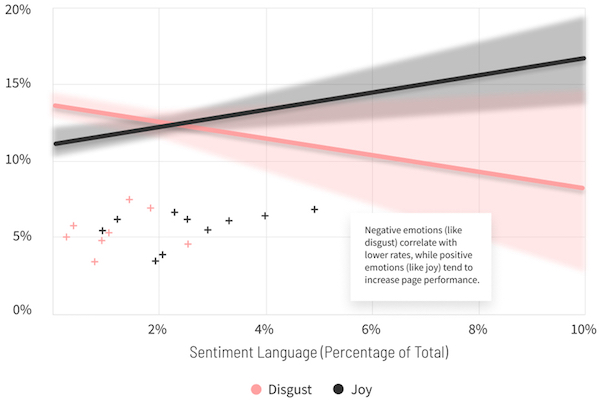The overwhelmingly negative tone that has pervaded news coverage since the early months of 2020 is, arguably, at least partially responsible for driving the historic surge of clicks and online content consumption that has occurred during the COVID-19 pandemic. But those sentiments have had the opposite effect on marketing campaigns, according to a new marketing study by conversion intelligence software company Unbounce.
Unbounce’s study analyzed millions of visits to thousands of websites across 16 different industry categories and studied how certain types of sentiment and emotional language might influence a site’s ability to convert traffic into potential customers. It found that the frequent occurrence of negative emotional language appeared to coincide with lower conversions across multiple industries, particularly businesses specializing in ecommerce, fitness and nutrition and home improvement.
In the ecommerce category, for example, the study found that conversions went down as emotional language with a negative connotation—such as sadness or fear, for example—went up, suggesting that while negative sentiment isn’t always necessarily a bad thing, it probably doesn’t pair well with ecommerce copy, where feelings of joy and anticipation are more likely to correlate with an increase in landing page performance.
Unbounce’s study found that online sellers in this category increased their use of emotional language in the last year, particularly negative language that evokes anger (up 8.9 percent), fear (up 6 percent) and sadness (up 8.1 percent).
Traffic to sites specializing in fitness and nutrition increased almost 125 percent in the last year, but also saw emotional language with significantly higher levels of negative sentiment, including words with an angry tone (up 13.4 percent) as well as disgust (up 9 percent) and fear (up 15.9 percent).
Unbounce’s data revealed that fitness and nutrition sites with positive and encouraging language—like words evoking joy, for example—correlated with much higher conversions, suggesting drill-instructor-style language could be hurting these business’ page performance.
On the other hand, the Unbounce study also discovered that, occasionally, positivity appears to result in a decrease in conversions. When it comes to education-based sites, for example, the study found that positive language—words related to joy and anticipation, for example— actually seemed to have a neutral or negative influence on whether visitors convert, suggesting an exception to the rule that being positive or upbeat is always a must for marketing campaigns.
Unbounce’s “Conversion Benchmark Report” used artificial intelligence to analyze the outcomes of 264 million visits to 44,000 landing pages between November 2019 and November 2020.



 Abandon traditional content plans focused on a linear buyer progression and instead embrace a consumer journey where no matter which direction they travel, they get what they need, stressed marketing pro Ashley Faus during O'Dwyer's webinar Apr. 2.
Abandon traditional content plans focused on a linear buyer progression and instead embrace a consumer journey where no matter which direction they travel, they get what they need, stressed marketing pro Ashley Faus during O'Dwyer's webinar Apr. 2. Freelance marketers and the companies that hire them are both satisfied with the current work arrangements they have and anticipate the volume of freelance opportunities to increase in the future, according to new data on the growing freelance marketing economy.
Freelance marketers and the companies that hire them are both satisfied with the current work arrangements they have and anticipate the volume of freelance opportunities to increase in the future, according to new data on the growing freelance marketing economy. Home Depot's new attempt to occupy two market positions at once will require careful positioning strategy and execution to make it work.
Home Depot's new attempt to occupy two market positions at once will require careful positioning strategy and execution to make it work. Verizon snags Peloton Interactive chief marketing officer Leslie Berland as its new CMO, effective Jan. 9. Berland succeeds Diego Scotti, who left Verizon earlier this year.
Verizon snags Peloton Interactive chief marketing officer Leslie Berland as its new CMO, effective Jan. 9. Berland succeeds Diego Scotti, who left Verizon earlier this year.  Norm de Greve, who has been CMO at CVS Health since 2015, is taking the top marketing job at General Motors, effective July 31.
Norm de Greve, who has been CMO at CVS Health since 2015, is taking the top marketing job at General Motors, effective July 31.


 Have a comment? Send it to
Have a comment? Send it to 
No comments have been submitted for this story yet.